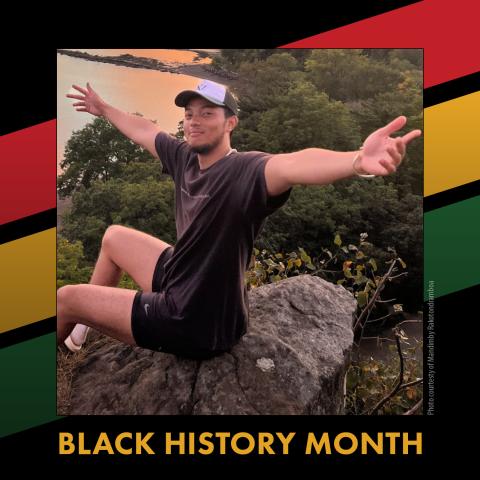Being an Afro-descendant student in Canada means cultural shock with an incredible amount of adaptation.

This blog post is part of our series for Black History Month 2024.
This is the journey of a young adventurer eager to explore the world. Allow me to introduce myself: my name is Mandimby, and I hail from the island of Madagascar. Yes, it’s much more than just an animated film; it’s a beautiful country with a population of over 21 million people. Fun fact: many people only know Madagascar through the DreamWorks animated film featuring the adventures of savanna animals, including the iconic character King Julian, the famous lemur. However, Madagascar is a country enriched by 18 ethnocultural groups, each with its own culture, customs, and traditions.
Yet not everything is as rosy as one might imagine. Despite the beauty of Madagascar’s diversity, there are numerous conflicts within the ethnocultural groups. On my end, I’ve witnessed and heard about various instances of discrimination, especially in terms of colourism. This is a form of discrimination based on skin colour, where individuals with lighter skin are often considered superior to those with darker skin (Mérentié: "Différence entre racisme et colorisme" | #connaistonvoisin | Radio-Canada, 2020). To my knowledge, it’s more prevalent among the central and coastal ethnicities. The Merina, the dominant ethnicity in the center of the island, generally have lighter skin, while those from the country’s shores typically have darker skin. Hurtful remarks and tensions between the central and coastal ethnicities are unfortunately all too common. These things simply should not be, as we are all human in the end, aren’t we?
Anyway, after completing secondary education in a French school, the typical path was to study abroad, with France being the destination for most. This was something I wasn’t particularly inclined to do, having already had the opportunity to spend time in Europe for vacations and sports competitions; I wanted to see something different. I quickly formed an idea of what I wanted. I heard about Canada through a friend, did my research, saw the breathtaking landscapes, and had always wanted to experience snow. So I went through the necessary steps, and it’s been four years since I arrived here in Montreal, Quebec.
As an Afro-descendant, I carry within me the history and richness of my culture, but I also discover the need to share it, to make it known in a context where diversity is celebrated.
Being an Afro-descendant student in Canada means a lot. It’s a cultural shock with an incredible amount of adaptation, in my opinion: two different realities, the “third world” and the “West.” I’m often asked to compare the two, and how I find each one. I say fascinating. For me, it has been a deeper understanding of our world.
Certainly, these two realities are not at all the same; each has a uniqueness that contributes to its beauty. On one hand, there’s culture, traditions, and deeply rooted customs. On the other hand, Canada has its modernity, diversity, and an atmosphere pulsating with the rhythm of a cosmopolitan society. For me, it’s been meeting people from all corners of the globe, discovering various cultures, which has been truly enriching. As an Afro-descendant, I carry within me the history and richness of my culture, but I also discover the need to share it, to make it known in a context where diversity is celebrated.
Of course, I think there will always be tensions wherever we go. Discriminations come in all forms, and I believe it’s quite common to experience this when you are a foreigner. Personally, I don’t believe I have truly experienced racism. Although I’ve heard shocking stories of people facing unjust treatment due to their skin color, encountering disdainful glances and expressions, I haven’t had that experience, and I thank God for it. It could be because of my presence in more cosmopolitan environments, luck, or simply my passivity in these situations; I honestly don't know. However, I remain aware that racism does indeed exist, through the stories I've heard and the experiences of others that I have also witnessed.
But beyond all of this, as I mentioned earlier, it’s the encounter with diverse cultures that has left a mark on me. Exchanging ideas with students from around the world and discovering different perspectives has enriched my worldview. And each passing day is a new opportunity for learning and discovery.
— Mandimby Rakotondramboa is a 23 year old from Madagascar; he is currently studying communications at the University of Montreal. He has a passion for sports, particularly tennis and weightlifting.
The views contained within these blogs are personal and do not necessarily reflect those of The United Church of Canada.